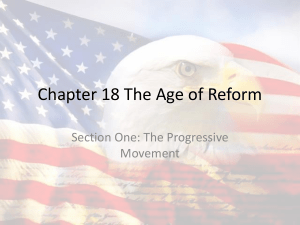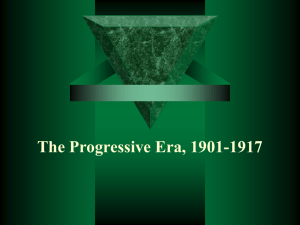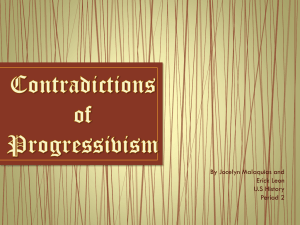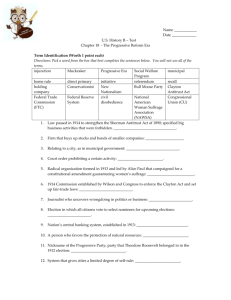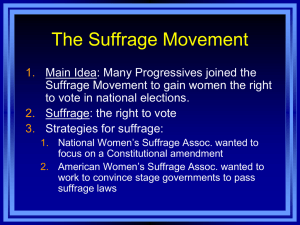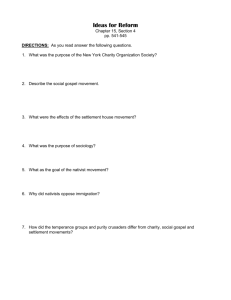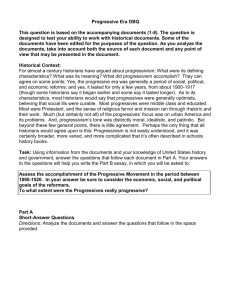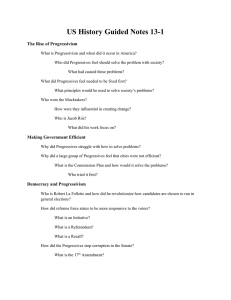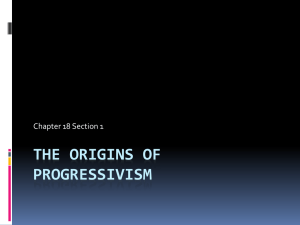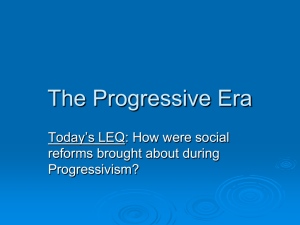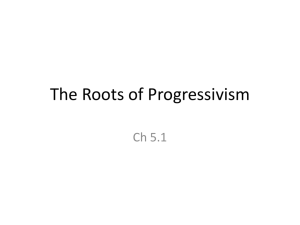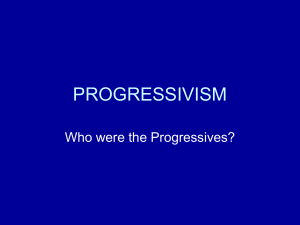the progressive movement (1890-1919)
advertisement
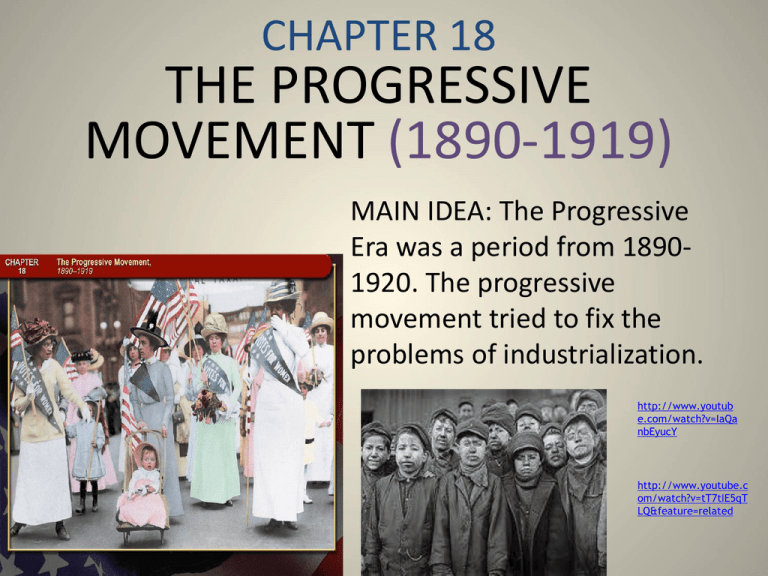
CHAPTER 18 THE PROGRESSIVE MOVEMENT (1890-1919) MAIN IDEA: The Progressive Era was a period from 18901920. The progressive movement tried to fix the problems of industrialization. http://www.youtub e.com/watch?v=IaQa nbEyucY http://www.youtube.c om/watch?v=tT7tIE5qT LQ&feature=related WHY IT MATTERS • Industrialization changed American society. Cities were crowded with new immigrants, working conditions were often bad, & the old political system was breaking down These conditions gave rise to the Progressive movement. Progressives campaigned for both political & social reforms for more than two decades & enjoyed significant successes at the local, state, & national levels. * Many Progressive-era changes are still alive in the U.S. today. * Political parties hold direct primaries to nominate candidates for office * The Seventeenth Amendment calls for the direct election of senators * Federal regulation of food and drugs began in this period 18.1 The Roots of Progressivism MAIN IDEA: Progressivism was a diverse response to the problems posed by industrialism and modern life. KEY TERMS • Progressivism • Muckraker • Jacob Riis • commission plan • Robert La Follette • direct primary • Initiative • Referendum • Recall • Suffrage • Alice Paul • Temperance • Prohibition • socialism WHO WERE PROGRESSIVES? * Progressive Era = era in American history from about 1890-1920 * Progressivism = collection of different ideas & activities about how to fix the problems within American society * Disagreed on the solutions, but agreed that gov should take a more active role in solving society’s problems * Gov needed to be fixed & made more responsive to people before other problems could be addressed * Progressives believed that they could fix society’s problems by applying scientific principles to society. • Muckrakers = group of journalists who investigated social conditions & political corruption – Articles public debate on social/eco problems – Ex: Jacob Riis How the Other Half Lives = poverty, disease, tenements, crime in NYC immigrant neighborhoods – Ex: Upton Sinclair – Ex: Ida Tarbell – Exposed Standard Oil illegal practices & monopoly *WHO WERE THE MUCKRAKERS? THE JUNGLE – UPTON SINCLAIR • http://www.youtube.com/watch?v=kHF_BWfSPik • His book draws national attention food and drug regulation by the government * Make gov more efficient to solve society’s problems – commission plans made experts, not politicians run city departments * The governor of Wisconsin, Robert La Follette, criticized how political parties ran their conventions direct primary * Three new reforms were introduced by progressives to force state legislators to respond to voter’s concerns. * 1. initiative = allowed a group of citizens to introduce legislation and required the legislature to vote on it * 2. referendum = allowed proposed legislation to be submitted to the voters for approval * 3. recall = allowed voters to demand a special election to remove an elected official from office * 17th Amendment = direct election of U.S. Senators * DEMOCRACY & PROGRESSIVISM * The movement for women’s voting rights was known as the suffrage movement *Suffrage = the right to vote * Resistance: unfeminine/immoral, abolitionists, or not politically active * (NAWSA) National American Woman Suffrage Association * Alice Paul & Carrie Chapman Catt *19th Amendment (1920) = women can vote *SUFFRAGE MOVEMENT * Campaign against child labor * Health & safety codes * Building codes dealing with fire hazards, unsafe machinery & working conditions * Workers compensation * The temperance movement called for the moderation or elimination of alcohol * pressed for prohibition = laws banning manufacture/sale/consumption of alcohol * SOCIAL WELFARE PROGRESSIVISM * Progressives focused on regulating big business * Gov. should break up big companies to restore competition * Creation of gov. agencies to regulate big companies & prevent them from abusing their power * Socialism = idea that gov should own/operate industry for the community as a whole * Eugene Debs led the American Socialist Party & was the party’s candidate for president in the election of 1912 * Most progressives & most Americans believed in the American system of free enterprise * PROGRESSIVES vs. BIG BUSINESS REVIEW: The Progressive Era 18901920 • • • • • • • • Progressivism was primarily a reaction against laissez-faire economics & it’s emphasis was on a more regulated market. Progressives also believed that gov. could/should fix society’s problems. The Progressive Era marks a time when numerous laws & reform are passed to deal with social & economic problems in favor of those struggling. A muckraker is journalist who exposed social problems such as horrible living conditions, bad working conditions, and political. corruption. After exposure, many times laws & regulation would get passed as a result. – Example: Upton Sinclair wrote “The Jungle,” which exposed the dangerous and uncleanliness of the meatpacking industry. His muckraking led to the passing of the Meat Inspection Act. – Jacob Riis wrote the book “How the other half lives” about the dirty & awful living conditions of NYC’s slum tenement housing. Suffrage means “the right to vote.” After many years of struggle for women, and numerous failed attempts to pass women's suffrage amendments, women were finally granted the right to vote by 1919. In 1919, the amendment passed (barely). Women were granted the right to vote through the 19th amendment in 1920.
